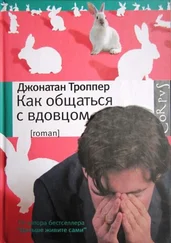Джонатан Троппер - This Is Where I Leave You
Здесь есть возможность читать онлайн «Джонатан Троппер - This Is Where I Leave You» весь текст электронной книги совершенно бесплатно (целиком полную версию без сокращений). В некоторых случаях можно слушать аудио, скачать через торрент в формате fb2 и присутствует краткое содержание. Год выпуска: 2009, ISBN: 2009, Издательство: Penguin Group (USA), Inc., Жанр: Проза, на английском языке. Описание произведения, (предисловие) а так же отзывы посетителей доступны на портале библиотеки ЛибКат.
- Название:This Is Where I Leave You
- Автор:
- Издательство:Penguin Group (USA), Inc.
- Жанр:
- Год:2009
- ISBN:978-1-101-10898-7
- Рейтинг книги:5 / 5. Голосов: 1
-
Избранное:Добавить в избранное
- Отзывы:
-
Ваша оценка:
- 100
- 1
- 2
- 3
- 4
- 5
This Is Where I Leave You: краткое содержание, описание и аннотация
Предлагаем к чтению аннотацию, описание, краткое содержание или предисловие (зависит от того, что написал сам автор книги «This Is Where I Leave You»). Если вы не нашли необходимую информацию о книге — напишите в комментариях, мы постараемся отыскать её.
This Is Where I Leave You — читать онлайн бесплатно полную книгу (весь текст) целиком
Ниже представлен текст книги, разбитый по страницам. Система сохранения места последней прочитанной страницы, позволяет с удобством читать онлайн бесплатно книгу «This Is Where I Leave You», без необходимости каждый раз заново искать на чём Вы остановились. Поставьте закладку, и сможете в любой момент перейти на страницу, на которой закончили чтение.
Интервал:
Закладка:
Paul digs into the large mound and tosses a scoop of muddy earth into the grave. He hands the shovel to me, and I do the same, and when the dirt hits the coffin I can feel something in me start to shake. I close my eyes against the hot wetness, and I can see Dad, reclining on a lounge chair in our backyard, gripping the hose gun and shooting at the moving targets of his young children as we ran between bases, making a machine-gun noise with his lips. He liked us as young children. It was when we grew older that he didn’t know what to make of us. Childhood feels so permanent, like it’s the entire world, and then one day it’s over and you’re shoveling wet dirt onto your father’s coffin, stunned at the impermanence of everything. I hand the shovel to Wendy, who digs up maybe a tablespoon or so of damp earth and who manages to miss the open grave entirely. Phillip, who is congenitally incapable of moderation, digs up a comically huge pile that turns out to have a stone in it. The stone hits the coffin like a gunshot, startling us all, and the gray silence is pierced by a long howl as Phillip falls to his knees, sobbing. “Daddy!” he cries, while the rest of us watch him unravel, standing by silently horrified and, probably, ever so slightly envious.
Chapter 5
We all reconvene at Knob’s End, the cul-de-sac where my parents’ house stands. The house, a large white colonial, stands at the center of the dead end, where the blacktop blossoms into a wide circle, ideal for street hockey and bike riding. West Covington is a major thoroughfare through Elmsbrook, winding its way past strip malls and corporate parks before finally veering off into the residential area, where at the last rotary, it becomes Knob’s End. When people give directions to any home or business on West Covington, they use our house as a negative landmark; if you see the big white house, then you’ve gone too far. Which is precisely what I’m thinking as I pull into the driveway.
Dad was obsessive about maintaining the house. He was a handy guy, always painting and staining, cleaning out the gutters, changing out pipes, power-washing the patio. He was an electrician by trade, but he gave it up to go into business, and he missed working with his hands, couldn’t face the weekend without the prospect of manual labor. But now the paint is cracked and flaking off the window frames, there’s an ugly brown water stain just below the roofline, the bluestones on the front walk rattle like loose teeth, and the rose trellises lean away from the house like they’re trying to escape. The lawn hasn’t been watered enough, and it’s brown in patches, but the twin dogwoods we used to climb are in full bloom, their crimson leaves fanned out like an awning over the front walk. Consumed with Dad’s slow death, Mom forgot to cancel the pool service, and so the swimming pool in the yard glistens with blue water, but the grass is starting to come up through the paving stones around it. The house is like a woman you find attractive at a distance. The closer you get, the more you wonder what you were thinking.
Linda Callen, our neighbor and my mother’s closest friend, opens the door and hugs each one of us as we step into the house. She’s a pear-shaped woman with an easy smile, and there’s something vaguely rodent-like about her, not in a feral way, but more like a wise mother rat from a Disney cartoon, the sort that will sit in a tiny rocking chair and wear little rat glasses and be voiced by Judi Dench or Hellen Mirren. A kindly, regal, Academy Award-winning rat. She’s known us since birth and looks at us as her own children. Her son, Horry, stands behind her, staring at his feet as he takes our coats.
“Hey, Judd,” he says to me.
“Hey, Horry.”
He stiffens up when I pat his back. “I’m very sorry about Mort.”
“Thanks.”
When Horry was a toddler, his father, Ted, got drunk and somehow managed to drown himself in little Horry’s inflatable wading pool while Linda was out shopping. She came home to find Horry shivering in the pool, crying hysterically over his partially submerged dead father. After that it was just the two of them, living up the block from us and, more often than not, in our house. A grade ahead of Paul and behind Wendy, Horry integrated seamlessly into our family. In high school, he fell for Wendy, like everyone else in Elmsbrook did at some point or another, but he had the inside track, and so for a year or so we would walk in on them making out in darkened rooms. Then, in his sophomore year of college, Horry got into a fight in a bar—details are sketchy—and the upshot was that someone took a sawed-off baseball bat to his head and now Horry is a thirty-six-year-old man who lives with his mother and cannot drive a car or focus on anything for more than a few seconds. Sometimes he has these mini seizures where he stiffens up and loses the ability to speak. Every day my dad would pick him up and take him with him to the store, where Horry helped out in the stockroom and took everyone’s lunch orders. Now I guess he’ll be working for Paul.
When Wendy sees Horry, she throws her arms around him without taking off her raincoat, and he drops the coats he’s gathered to hug her back.
“Hey, Sunflower.”
“Horry,” she whispers into his neck.
His shirt is speckled with raindrops from her coat. He kisses her wet scalp, and when she pulls back, her eyes are red.
“Don’t cry,” he says.
“I’m not,” she says, and then bursts into tears.
“Okay, okay,” Horry says, blinking nervously as he bends down to pick up the coats he dropped.
SERENA, WENDY’S BABY girl, screams like she’s been stabbed. We can all hear her in amplified stereo as we eat lunch, thanks to the high-tech baby monitor Wendy has set up on the table in the front hall, but Wendy doesn’t seem at all inclined to go upstairs and quiet the baby. “We’re Letting Her Cry,” she announces, like it’s a movement they’ve joined. If they’re letting her cry anyway, I don’t really see the point of the baby monitor, but that’s one of those questions I’ve learned not to ask, because I’ll just get that condescending look all parents reserve for non-parents, to remind you that you’re not yet a complete person.
And the screaming baby is the least of it. Ryan, Wendy’s six-year-old, has discovered the living room piano, which hasn’t been tuned in decades, and he’s pounding out a throbbing cacophony with both fists. Barry, who has decided that now would be an optimal time to return some business calls, is pacing the hall between the dining room and the living room, loudly arguing the finer points of some deal that will no doubt add to his already grotesque fortune. Because he’s wearing a wireless earpiece, he looks like a lunatic ranting to himself. “The Japanese will never go for that,” he says, shaking his head. “We’re ready to commit, but the paper price is unacceptable.”
The thing about people who work in finance is that they consider their job infinitely more important than anything or anyone, and so it’s perfectly legitimate to tell everyone else to fuck off because they have a conference call with Dubai. Billions of dollars are involved, so things like a kid’s birthday or a wife’s dead father are simply not at the top of the agenda. Barry is almost never around, and when he is, he’s on the phone or scanning his BlackBerry with the furrowed brow of one who is dealing with shit that dwarfs your shit exponentially. If Barry was sitting next to the president of the United States during a nuclear attack, he’d still be staring down at his BlackBerry with his default expression, the one that says You think you’ve got problems? From what I can see he is not very good to Wendy, barely registers her existence, and leaves her to do all the heavy lifting with the kids. Wendy, though, has inherited our mother’s genetic imperative to keep up appearances. Everything is wonderful. Period.
Читать дальшеИнтервал:
Закладка:
Похожие книги на «This Is Where I Leave You»
Представляем Вашему вниманию похожие книги на «This Is Where I Leave You» списком для выбора. Мы отобрали схожую по названию и смыслу литературу в надежде предоставить читателям больше вариантов отыскать новые, интересные, ещё непрочитанные произведения.
Обсуждение, отзывы о книге «This Is Where I Leave You» и просто собственные мнения читателей. Оставьте ваши комментарии, напишите, что Вы думаете о произведении, его смысле или главных героях. Укажите что конкретно понравилось, а что нет, и почему Вы так считаете.







![Джонатан Троппер - Как общаться с вдовцом [litres]](/books/429483/dzhonatan-tropper-kak-obchatsya-s-vdovcom-litres-thumb.webp)
![Джонатан Троппер - Дальше живите сами [litres]](/books/429484/dzhonatan-tropper-dalshe-zhivite-sami-litres-thumb.webp)



